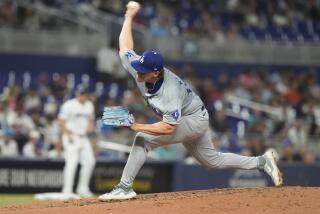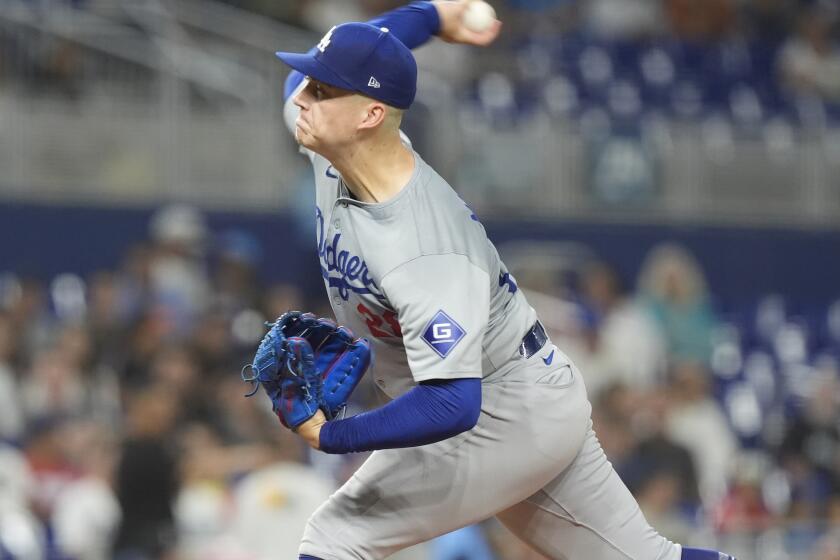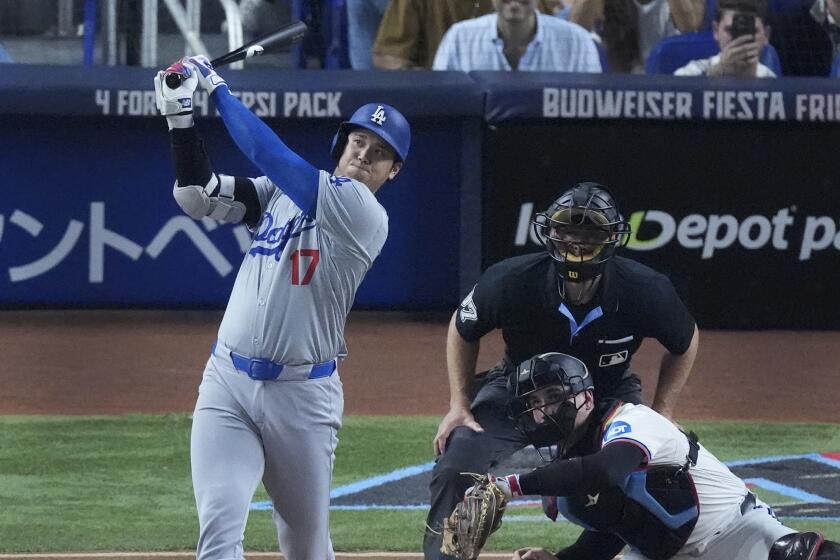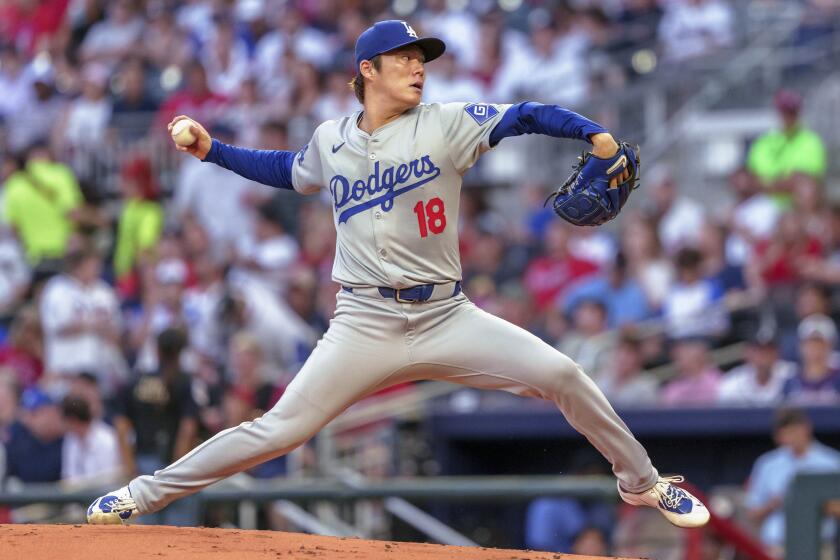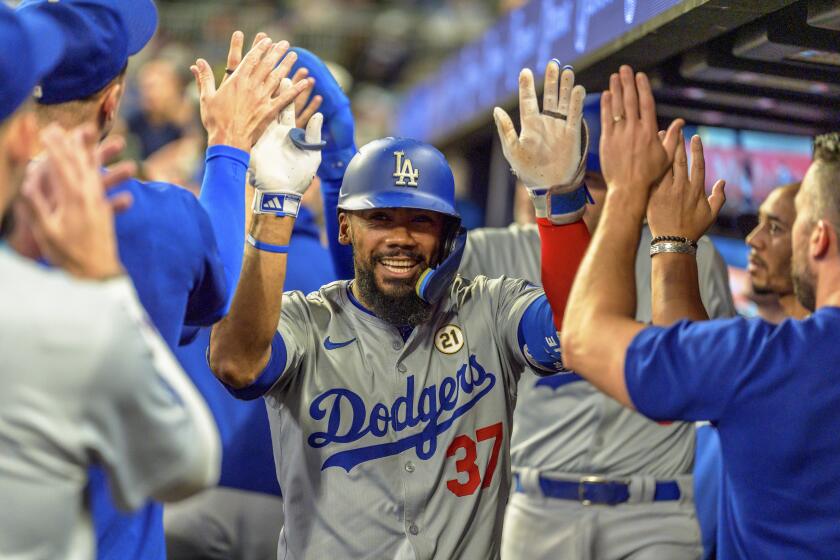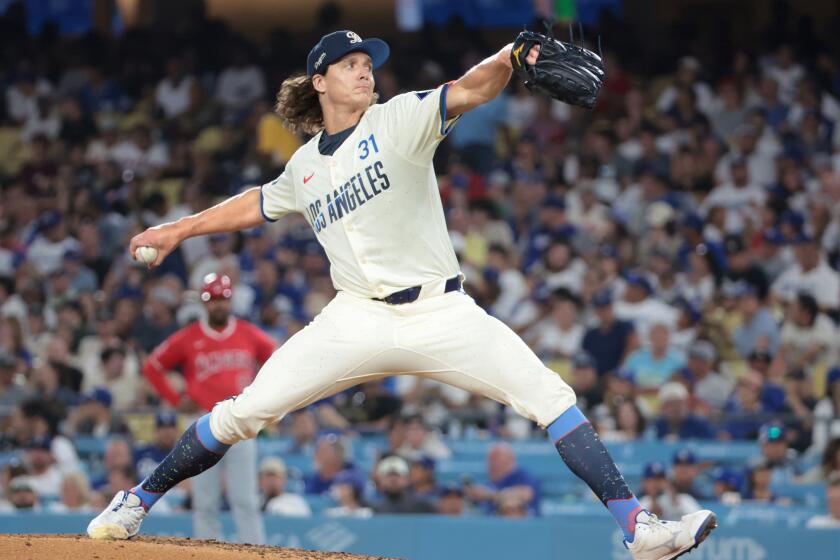Bowa’s arrival gives Dodgers a wake-up call
VERO BEACH, Fla. -- No! No! No!
It’s 10 a.m., and Larry Bowa is working on four hours’ sleep.
How old are you! How can you be tired? How?
It’s batting practice for everyone else, but winning practice for kids Andy LaRoche and Chin-lung Hu.
Hu! You can’t be tired, are you kidding me!
Bowa is engaging in the time-honored act of yawning coaches hitting infielders lazy grounders.
Except they’re not lazy, they’re incessant. And they’re not grounders, they’re earth-scorchers.
And Bowa is not yawning. He shows up for work every morning before 7, yet the Dodgers have yet to see him yawn.
What do I want you to do? I want you to catch it! How’s that? Just catch it!
Hu and LaRoche catch it, but no, Bowa wants more, he always wants more.
He wants it caught with energy. He wants it caught with accountability. And you better make the doggone throw.
That’s an E-6! That throw is an E-6! C’mon, you can’t be tired!
He’s 62, he hasn’t caught a ground ball in more than 20 years, yet the new Dodgers third base coach has spent this spring spraying around the sort of knowledge and intensity that makes him their second-most important off-season acquisition.
How can Joe Torre sit in the dugout so coolly?
Because, where he once had Don Zimmer, now he has Larry Bowa.
“Fire and ice,” Torre says.
If Torre is that graceful duck gliding across summer, Bowa is the furious one paddling underneath.
“We’re connected at the hip,” Torre says.
If Torre is the fatherly schoolhouse administrator, Bowa is the vice principal with a paddle.
“The way I do it, you want someone in there who will always speak their mind, call it like they see it, and that’s Larry,” Torre says. “Once the players understand him, and see that nobody cares about them more than he does, it will start to have an effect on them.”
Torre saw it during their two years together with the Yankees. The baseball world has seen it during Bowa’s 43 years in the game, as he rose from an undrafted free agent to own the best career fielding percentage (.980) of any shortstop in National League history.
In five full years as a manager in San Diego and Philadelphia, he had two losing seasons. He has since become one of the game’s most coveted third base coaches because he can say what a manager cannot.
“I believe in work ethics, no short cuts,” he says. “Guys get to the big leagues, make a lot of money, and don’t understand that there is still a price to pay.”
So far this spring, with bursts of energy that ring like an old-fashioned cash register, he is showing the Dodgers that price.
They were not a great fundamental team last season -- Bowa is attacking that with furious daily 8:30 a.m. tutorials.
Says LaRoche: “I’m out there just waking up, and he’s ready to go.”
The Dodgers were a horrible baserunning team last season -- Bowa is working on that with constant baserunning counseling in the dugout.
Says James Loney: “I’m thinking he might not ever go to sleep.”
The Dodgers weren’t always a well-run team during the late innings last season. Bowa also will help change that, given his reputation as one of the game’s best strategists.
“He’s a guy I can count on for input,” Torre says. “It’s great to have him in that same dugout.”
It was the other stuff that kept Bowa from consistently holding a manager’s job. Yet that aggressiveness and attitude make him invaluable as a coach.
He was unemployed for about three minutes last fall before the Seattle Mariners called him. Torre spoke to the Dodgers for about three minutes before he called Bowa and asked him to forget Seattle.
What if Bowa had been here last fall during the conflict between the veterans and kids?
“First, if you are a kid and that sensitive about a veteran’s comments, shame on you,” Bowa says. “But second, if you are a veteran and have a problem with a kid, you need to lead by example, work hard every play, run out every ground ball.”
With Bowa waiting for them in the clubhouse, here’s guessing all Dodgers, young and old, will now be running out grounders.
“If this team wants to play .500 ball, fine, just keep the status quo,” Bowa says. “But I want to be playing in October, and that means we have to work extra, take it to the next level, put in the time, put in the heart.”
Bowa has heard the word “great” used often this winter in relation to the Dodgers kids, and he laughs.
“That’s a word that gets you in trouble,” he says. “You can’t call somebody ‘great’ if they haven’t done it yet. I’ve seen lots of kids with great tools who didn’t have the work ethic.”
He says he likes the Dodgers’ kids, but he says they still have much to learn.
“Forget the tools, they have to come out here and show it,” he says. “They have to show they can sacrifice. They have to show they will go down in the foxhole with you. Because for us to win, everybody in the clubhouse has to go down in that foxhole.”
Bowa, whose Phillies’ foxhole won a World Series championship in 1980, is so old-school that this spring he initially refused to adhere to the new rule that all base coaches wear a batting helmet.
He finally relented, but his players understood.
“He’s so intense, he so hard-nosed, it rubs off on all of us,” LaRoche says.
It better.
This drill is easy for me! We’ll stay out here all day until we get it right! Move your feet! Move your feet!
--
Bill Plaschke can be reached at bill.plaschke@latimes.com. To read previous columns by Plaschke, go to latimes.com/plaschke.
More to Read
Are you a true-blue fan?
Get our Dodgers Dugout newsletter for insights, news and much more.
You may occasionally receive promotional content from the Los Angeles Times.


